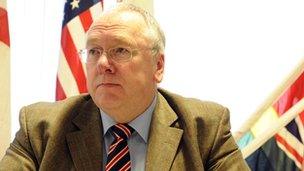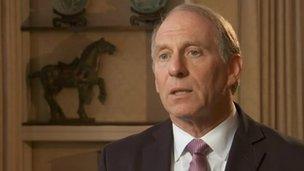Time the enemy for Richard Haass talks
- Published

The inclusion of Rev Mervyn Gibson on the DUP's talks team shows how important the issue of parading is
When Richard Haass sits in Belfast's Europa hotel and surveys the traffic on Great Victoria Street, it may all seem very familiar for the American diplomat.
Dr Haass was President Bush's special envoy to Northern Ireland from 2001 to 2003 and is well acquainted with the political geography of Northern Ireland.
He is on first-name terms with party leaders and knows in detail the arguments that will dominate the discussions over flags, parades and the past.
He is aware of the task ahead but accepts that he can not impose solutions. Ahead of arriving in Belfast he declared that "no outsider can manufacture consensus".
So in which areas can compromise be reached?
The one obvious issue where common ground may be found quickly is parading.
Back in 2010, the DUP and Sinn Féin drew up a blueprint to replace the Parades Commission. Orangemen linked to the Traditional Unionist Voice (TUV) and Ulster Unionist Party (UUP) persuaded the Grand Orange Lodge not to back the DUP-endorsed proposal and the plan died.
Blueprint
This time the DUP have selected the Reverend Mervyn Gibson, a senior Orangeman, as one of their talks delegates. Rev Gibson's selection indicates how key the issue of parading is and shows how keen the DUP are to garner Orange support for any new proposals.
Likewise, Sinn Féin have selected veteran republican Seán Murray as one of their delegates. He has previous experience of reviewing the parading issue.
If Dr Haass could amend the 2010 proposal and perhaps use it as a blueprint, a solution could be possible. A new parades commission with a new name that has cross-community backing might enjoy greater community confidence than the current body.
Like parading, finding political agreement over the use of flags will prove very difficult for Dr Haass. However, if a protocol can be found over parading, agreement over the use of flags could follow.
It will not be easy, as the events surrounding the union flag controversy at Belfast City Council indicate.
Elsewhere, contentious parades at Castlederg, Ardoyne and in Belfast city centre illustrate the tensions that exist on the ground and highlight how the unionist and nationalist communities view the same events through different eyes.
Dealing with the past remains Dr Haass's toughest challenge.
Lack of time
Nothing divides Northern Ireland's politicians more than the history of the past 40 years. There is not even political agreement on what constitutes a "victim" and previous initiatives that have examined the legacy of the past have proved controversial.

Richard Haass is well acquainted with the political geography of Northern Ireland
The Consultative Group on the Past, co-chaired by Lord Eames and Denis Bradley, came up with 31 proposals including the idea of a legacy commission headed by an international figure. However, the report failed to get political consensus and its conclusions were not acted upon.
SDLP MP Margaret Ritchie thinks Dr Haass should use the work of Lord Eames and Denis Bradley as a template. She said: "We could certainly look towards Eames/Bradley for guidance. In fact, around 90% of the Eames/Bradley report could be utilised as we attempt to resolve the issues around the past."
Lack of time may be one of Dr Haass's problems. The diplomat, who is being assisted by Harvard professor Meghan O'Sullivan and Charles Landow, has 12 weeks to examine the same ground that Lord Eames and Denis Bradley took many months to examine.
Despite the tensions of the summer and the difficult agenda facing the former US envoy, some positive noises are being made. The DUP's Simon Hamilton said his party is committed to solving the "outstanding issues" but admitted that "grave differences still exist between Sinn Féin and the DUP".
In turn, Sinn Féin's John O'Dowd said his party is "prepared to compromise", but stressed solutions must be based on "equality and respect for all".
UUP leader Mike Nesbitt said his party is prepared to engage with the talks process. He said: "By failing to deal with some of the more challenging aspects of our divided society, political progress is held hostage by our past, the legacy of which can derail us at any moment."
Chris Lyttle from the Alliance Party, who is a talks delegate, said that Dr Haass's agenda must address divisions in society. He said: "To achieve a genuine shared future, a comprehensive strategy that tackles all the issues must be delivered."
Dr Haass hopes to deliver his report in December. The clock has started to tick.